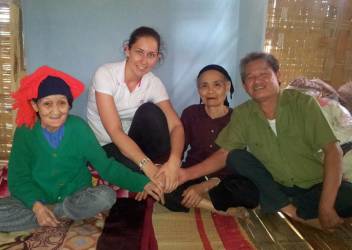 I feel like I am riding the crest of a global wave. The year I turn 60 is the same year Earth is predicted to hold more people over 60 than children under 14. I know I won’t be alone though, as there will be about 2 billion of us over 60, with nearly two-thirds living in Asia.
I feel like I am riding the crest of a global wave. The year I turn 60 is the same year Earth is predicted to hold more people over 60 than children under 14. I know I won’t be alone though, as there will be about 2 billion of us over 60, with nearly two-thirds living in Asia.
As an Australian Youth Ambassador for Development (AYAD), and therefore currently classified as “young”, it’s somewhat comforting to know of the issues I am likely to face.
Three issues have been identified by older people all over the world as urgent; earning a secure income, access to affordable healthcare and continued social interaction to avoid isolation. In this context, I find myself in HelpAge’s East Asia Pacific Regional Office in Chiang Mai, Thailand.
Family support for older people is changing
According to Eduardo Klien, HelpAge International Regional Director for East Asia Pacific, ageing was not previously on the public agenda, but it has now acquired a profile due to the rapid demographic transition. In Australia, there is a perception that in Asian cultures, there are strong family bonds and adult children take care of their ageing parents.
While Eduardo confirms this is generally accurate, he says the pace of modernisation, shrinking family size and intense migration is reshaping family support for older people. “In many cases, this support takes the form of remittances (sending money home) over direct personal care,” he says.
Right now I’m in the thick of it as there are already 447 million older people in Asia, almost 20 times the size of Australia’s current population. With around a third of the population of East Asia and Pacific living on less than US$2 a day, and large portions of the Asian population not covered by pensions, the people HelpAge assists are already facing significant challenges to get by in life.
Providing good practices and sharing expertise
With the number of older people in Asia expected to triple to 1.3 billion by 2050, the task of helping older people could seem overwhelming to the HelpAge team of around 60 people spread across East Asia. Eduardo is philosophical though. “We have to be ambitious and at the same time have modesty in the face of monumental challenges,” he says.
“We know that developing policies and practices is the shared responsibility of governments, academics, civil society and other stakeholders. What HelpAge can do is provide examples of good practices, and share experiences and expertise in those initiatives that are practical and affordable.”
HelpAge International has hosted AYADs previously and Eduardo believes we have been instrumental in stepping up the work in communications, improving the skills of the team and the quality of outputs. “The volunteers have also helped to facilitate and spread knowledge to country offices in the region,” he says.
Building the capacity of country offices is one of my favourite parts of the communications assignment. For instance I was invited to travel to Vietnam to conduct training to develop the capacity of local staff (and staff from partner organisations) to more effectively communicate their project activities and outcomes to stakeholders.
Initially the majority of participants were unsure or not confident about planning and writing content for communications materials and using elements of visual design. Following the training, all participants who responded to my online survey felt confident or very confident about both these topics.
Bringing skills and experience
This method of developing and evaluating training content is an example quoted by Ms Chattip Soralump of a change implemented at HelpAge as a result of an AYAD. Chattip has been a counterpart to two AYADs during her five years at HelpAge. She enjoys working with AYADs because, she says, “the volunteers come fully equipped with the skills and experience appropriate to the position. As a result, they only need a short time to adjust.”
Both Chattip and Eduardo agree that the benefits of the AYAD Programme flow both ways, as the AYADs discover more about the demographic transition that is currently underway in Asia and across the world.
“AYADs learn from the mission of HelpAge and are more aware of the challenges an ageing society presents, plus the options available to support older people,” Eduardo says.
In 2012, two people celebrated their 60th birthday every second. If all goes well, I hope to be there in 2045, celebrating my 60th birthday with the other 2 billion older people. I’ll be there, surfing that wave to the end.
Find out more about population ageing on our Global AgeWatch portal and by downloading our Ageing in the 21st Century report.
